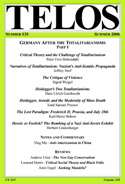Each Tuesday in the TELOSscope blog, we reach back into the archives and highlight an article whose critical insights continue to illuminate our thinking and challenge our assumptions. Today, Marcus Michelsen looks at Todd Samuel Presner’s “Heidegger, Arendt, and the Modernity of Mass Death,” from Telos 135 (Summer 2006).
 We are all going to die. Of course, this is a platitude. Is death a social or a personal event? It is a strange point of intersection where an inexpressibly personal experience gives expression to meaning for the group. A meaning that is enjoyed or suffered by people who, in a very clear sense, are not taking part in the very event that serves as its point of origin. Whose event, then, is my death? This question becomes irrelevant in the face of mass death, because, here, my death ceases to be a singular event. It is buried in a crowd, innumerable through the multiplication of the killed—my life and my death are both stolen from me. How are we to think of this other kind of death?
We are all going to die. Of course, this is a platitude. Is death a social or a personal event? It is a strange point of intersection where an inexpressibly personal experience gives expression to meaning for the group. A meaning that is enjoyed or suffered by people who, in a very clear sense, are not taking part in the very event that serves as its point of origin. Whose event, then, is my death? This question becomes irrelevant in the face of mass death, because, here, my death ceases to be a singular event. It is buried in a crowd, innumerable through the multiplication of the killed—my life and my death are both stolen from me. How are we to think of this other kind of death?
In “Heidegger, Arendt, and the Modernity of Mass Death,” from Telos 135, Todd Samuel Presner writes:
Thus, more than a decade before Being and Time was published, the possibility of death—as my ownmost, uttermost, individualizing potentiality—had already fundamentally begun to change in Europe with the experiences of the First World War. Death could no longer be authentically anticipated, let alone planned for in the inauthentic sense of considering it as an “event.” Moreover, it could not be made meaningful by burial services, morning rituals, and traditional commemorative ceremonies that individualized the dead. The deceased were often mutilated beyond recognition, their corpses radically unidentifiable, and their bodies swallowed up anonymously by blood-and rain-soaked trenches. Mass graves become the norm with the advent of technologies that facilitated an infinitely reproducible death. Dying was no longer a singular, individualizing possibility, able to be anticipated as a way of being; rather, death was now suffered en masse as a nullifying actuality. Death in the age of mechanical annihilation transformed the entire nature of dying and, I would submit, the very concept of being human. This, however, is not something Heidegger seriously explored. Perhaps, then, the mass death of the First World War not only forms the “traumatic unconscious” for Heidegger’s (and Rilke’s) reflections of death but also the negative condition of possibility for the philosopher’s insistence on preserving the paradigm of authenticity. But for Heidegger, mass death is, by definition, not death.
Presner’s essay prompts us to wonder whether a conceptual possibility, or perhaps better said impossibility of conceiving of death as death, opened the door to the practices of conscious and calculated killing that characterized the decades to come. The “fabrication of corpses,” as Heidegger puts it in his Bremen speech—the literal production of dead bodies—occupies a central role in Presner’s analysis of mass death. Here, mass death is not seen as something that happens to persons who die, but is mechanically produced. “Do they die?” becomes, for Heidegger, a legitimate question. Presner’s essay brings to mind the multiplicity of ways in which death can be conceptualized as a social, political, or even technical event, and is thus transposed from one scheme to another with a frightening variation of its moral implications.
The question of the meaning of death clearly strikes home today as the central axiom of terrorism—to turn death into an act of terror, to imprint upon it a specific and horrifying meaning—and the war to combat this kind of death, “The War on Terror,” which is now called “the conflict in Afghanistan.” The meaning of death has once again found itself at the center of the international political scene in the form of suicide bombings where the killer effaces him or herself in the act of killing in order to become an agent of terror, while pilotless drones fire missiles from the sky in order to prevent terrorism. Within the conceptual framework of the twenty-first century, we are confronted with new and problematic kinds of death. The notion of anonymous death provides crucial insight into the practices of conceptualization and modes of life that they entail for our present day conflict. Presner’s article sheds key insight onto the difficulties of conceptualizing death, and the profound implications its conceptualization has for both our personal and political lives.
Read the full version of Todd Samuel Presner’s “Heidegger, Arendt, and the Modernity of Mass Death” at the TELOS Online website. If you are affiliated with an institution that is an online subscriber to Telos, you have free access to our complete online archive. If not, you can purchase 24-hour access to this and other Telos articles at the low rate of $5/article.



